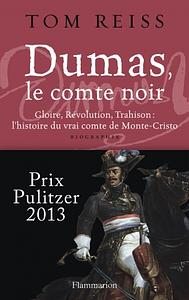Take a photo of a barcode or cover
General Alex Dumas had great timing, and then terrible timing. An extraordinary man who managed to live through the time (French Revolution) where his mixed race didn't keep him from advancing, and then the Napoleonic era when it suddenly did matter again. His son, the novelist, seemed to think he could do no wrong, and used many of the stories about Dumas Sr.'s life as inspiration for his novels.
Much of the book was very interesting, though there were some parts that lagged a bit. I especially appreciated the insights into the French Revolution, the disarray of the post-revolution bureaucracy and its views about spreading the revolution to other countries.
Much of the book was very interesting, though there were some parts that lagged a bit. I especially appreciated the insights into the French Revolution, the disarray of the post-revolution bureaucracy and its views about spreading the revolution to other countries.
Run, do not walk, to read this fabulous book. Not only will you get a description of Dumas's incredible father, inspiration of most of the author's heroes, but you'll get an incredible cross section of history that ties together the slave trade, the American revolution, the French Revolution, and the Napoleonic years. Highly recommend, one of my favorite books of the year.
I really liked this book- I was a childhood reader of "The Count of Monte Cristo" and "The Three Musketeers" and the background of the real characters made it come alive for me. Beautifully written.
informative
medium-paced
This Pulitzer Prize-winner is a remarkable biography of the sadly least well-known of the Trois Dumas - the pere of Alexandre Dumas, pere. It fills many gaps in the historical record - at least as received by me :) Normally, the Napoleonic era is one of my least favorite historical periods to learn about, because my European history education (particularly in this era) was poor. Some details escape me, but many never made it into my cranium in the first place. That made for a few rough patches (especially in audio, with properly pronounced French names I couldn't envision quickly), but what lifts this from a 4 to a 5 star read for me was that it didn't impair the overall thrust of the life story Reiss tells. Readers interested in the history of race relations, democratic revolutionary movements, historical inspiration for literature and, of course, the Napoleonic era will find much to enjoy and enlighten here.
Amazing read, Alex Dumas is clearly the inspiration for so many of his son’s writings.
This story of Alexandre Davy de la Pailleterie, also known as Alexandre Dumas or Alex Dumas, follows closely the movement toward and back away from equality and freedom for all men in 18th century France. This great general's biography is thick with French Revolutionary history, Napoleon's uprising, and the rise and fall of enlightenment in France with regard to equality and human rights over profits.
It demonstrates just how much one can achieve with access to education and resources no matter how far behind he/she begins. It's also a perfect illustration of how much damage one person can do to entire country and its people. Because of Napoleon and those who ensured financing his endeavors, Alex Dumas' story of being born to a life entrenched in slavery to an interracial couple then achieving one of the highest military rankings ends as a tragedy in poverty, injustice, and obscurity.
The book is excellently researched and well written. Certainly a pleasure to read about Alexandre Dumas' father and inspiration for so much of his writing; it's always interesting to see how a writer incorporates real people and events into fictional characters and stories. The author's love and awe for his amazing father truly comes to light through this book.
It demonstrates just how much one can achieve with access to education and resources no matter how far behind he/she begins. It's also a perfect illustration of how much damage one person can do to entire country and its people. Because of Napoleon and those who ensured financing his endeavors, Alex Dumas' story of being born to a life entrenched in slavery to an interracial couple then achieving one of the highest military rankings ends as a tragedy in poverty, injustice, and obscurity.
The book is excellently researched and well written. Certainly a pleasure to read about Alexandre Dumas' father and inspiration for so much of his writing; it's always interesting to see how a writer incorporates real people and events into fictional characters and stories. The author's love and awe for his amazing father truly comes to light through this book.
Incredibly readable for non-fiction. While I'm sure it would bug some purist, I appreciated the author occasionally interjecting with "I" statements. If he needed to explain that he couldn't find certain information, if there were conflicting stories, he said "I looked and couldn't find this." This made it feel more like a really smart friend telling you a story than a history text trying to give an unbiased view.
Other have said they didn't like all the historical background, that they just wanted to learn about General Dumas. I think they have forgotten that we are products of our environment. It wouldn't be enough to say that Dumas didn't like his dad so he took his mother's name. You need to understand WHY and how it was a big deal, considering his father's background. You can't really understand why Dumas didn't like Napoleon or why Napoleon didn't like Dumas, with out understanding at least the basics of the French Revolution and how Dumas felt about them. This historical background was simply put and added toy understanding of the time, and the man. Also, for one who barely remembers any European History, it was a good crash course for me.
Also, as another reviewer stated, Napoleon was jerk-face.
Other have said they didn't like all the historical background, that they just wanted to learn about General Dumas. I think they have forgotten that we are products of our environment. It wouldn't be enough to say that Dumas didn't like his dad so he took his mother's name. You need to understand WHY and how it was a big deal, considering his father's background. You can't really understand why Dumas didn't like Napoleon or why Napoleon didn't like Dumas, with out understanding at least the basics of the French Revolution and how Dumas felt about them. This historical background was simply put and added toy understanding of the time, and the man. Also, for one who barely remembers any European History, it was a good crash course for me.
Also, as another reviewer stated, Napoleon was jerk-face.
General Alex Dumas deserves better than to be forgotten – so it’s fortunate that his son was Alexandre Dumas, who would write his father into his fiction in many guises, and also that his biographer Tom Reiss had the fortitude to seek out the records that detail his feats. Born, raised and living in a brief window of time where a biracial son of a slave and a French nobleman could rise to a generalship in the revolutionary and Napoleonic armies, Alex Dumas is revealed as a respected leader, an honorable man, and practically an action hero – brought down by his commander’s jealousy and ineptitude, as well as the increasingly toxic racial politics of the Napoleonic era. Nearly scrubbed from history after his death, he might now be unknown if not for his son’s celebrity and the efforts of their admirers. Highly educational and highly recommended. -- Hillary D.
adventurous
informative
inspiring
slow-paced






